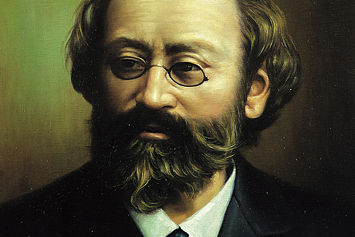Max Bruch – Fantasia Scozzese, Kol Nidrei
Max Bruch – Fantasia Scozzese, Kol Nidrei

Fantasia Scozzese for Violin and Orchestra
1. Grave – Adagio
2. Allegro
3. Andante sostenuto
4. Finale. Allegro
Jascha Heifetz - violin
RCA Victor Symphony Orchestra
Willliam Steinberg - conductor
Kol Nidrei for Cello and Orchestra Op.47
Pablo Casals - cello
London Symphony Orchestra
Albert Coates - conductor
Bruch composed Scottish Fantasy in 1880 for violinist Pablo de Sarasate, who played the first performance at Hamburg in September of that year. Bruch wrote more for Sarasate than did any other composer, and while Bruch was fonder of his Second Concerto, the Fantasia Freely Using Scottish Folk Melodies (the present work's formal title) proved to be far more popular.
Bruch freely admitted the influence exerted upon the work by Sir Walter Scott, whose writings had ensnared ruch's attention during a conducting stint in England in 1880; Scott's Lady of the Lake inspired a subsequent cantata, Das Feuerkreuz. The Fantasia opens with a slow, solemnly bardic introduction for brass and harp, and then a recitative for the soloist on a soft cushion of strings. This leads directly to an Adagio cantabile in E flat major, based on the song "Auld Robin Morris," with the harp nearly as prominent as the violin's decorations.
The G major second movement has various titles—"Scherzo: Allegro" and "Dance"—and is based on "Hey, the Dusty Miller." Drone basses imitate the sound of bagpipes, while the violin adds all manner of pyrotechnics after it introduces the tune on double-stopped strings (two strings played with one stroke of the bow). The merriment ends with a bridge passage recalling "Auld Robin Morris." This leads without pause to the third movement, a set of plushly sonorous variations in slower time, Andante sostenuto, on the song "I'm Down for Lack o' Johnnie." The violin rhapsodizes eloquently throughout, and concludes with a memorable sigh.
Bruch gave his finale the same warlike marking, Allegro guerriero, that Mendelssohn used in the last movement of his Scottish Symphony. "Scots wha hae" is the dominant folk melody, legendarily sung by Robert the Bruce at the Battle of Bannockburn. The violin adds excitement by playing on two, three, even four strings simultaneously until a tender reprise of the first movement. "Scots wha hae" returns, however, to conclude the four-movement work rousingly. ---AMG
Max Bruch subtitled his Kol Nidrei "An Adagio on Hebrew Themes for Cello and Orchestra." Composed in 1881, the work is based on two Jewish themes that Bruch described as "first-class." "The first is an age-old Hebrew song of atonement, the second (D major) is the middle section of a moving and truly magnificent song 'O Weep for Those That Wept on Babel's Stream' (setting words by the English poet Byron), equally very old. I got to know both melodies in Berlin, where I had much to do with the children of Israel in the Choral Society," wrote the composer. However, as has been pointed out by Jewish musicians and scholars since the work's premiere, Bruch's secular treatment of the themes hardly qualifies his Kol Nidrei as a piece of Jewish music. As Bruch himself recognized, his Kol Nidrei is no more a Jewish work than his Scottish Fantasy is a Scottish work. In both works, Bruch treated the themes as folk tunes that he took as themes for art music compositions. Bruch was, nevertheless, a master at transforming his "folk tunes" into art music, but still retaining their folk elements. The combination of Bruch's late Romantic expressive harmonies and his Jewish themes created a work of great power and beauty that has maintained its place in the repertoire. ---AMG
download: uploaded anonfiles mega 4shared mixturecloud yandex mediafire ziddu
Zmieniony (Niedziela, 22 Wrzesień 2013 13:05)








